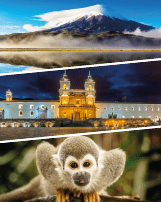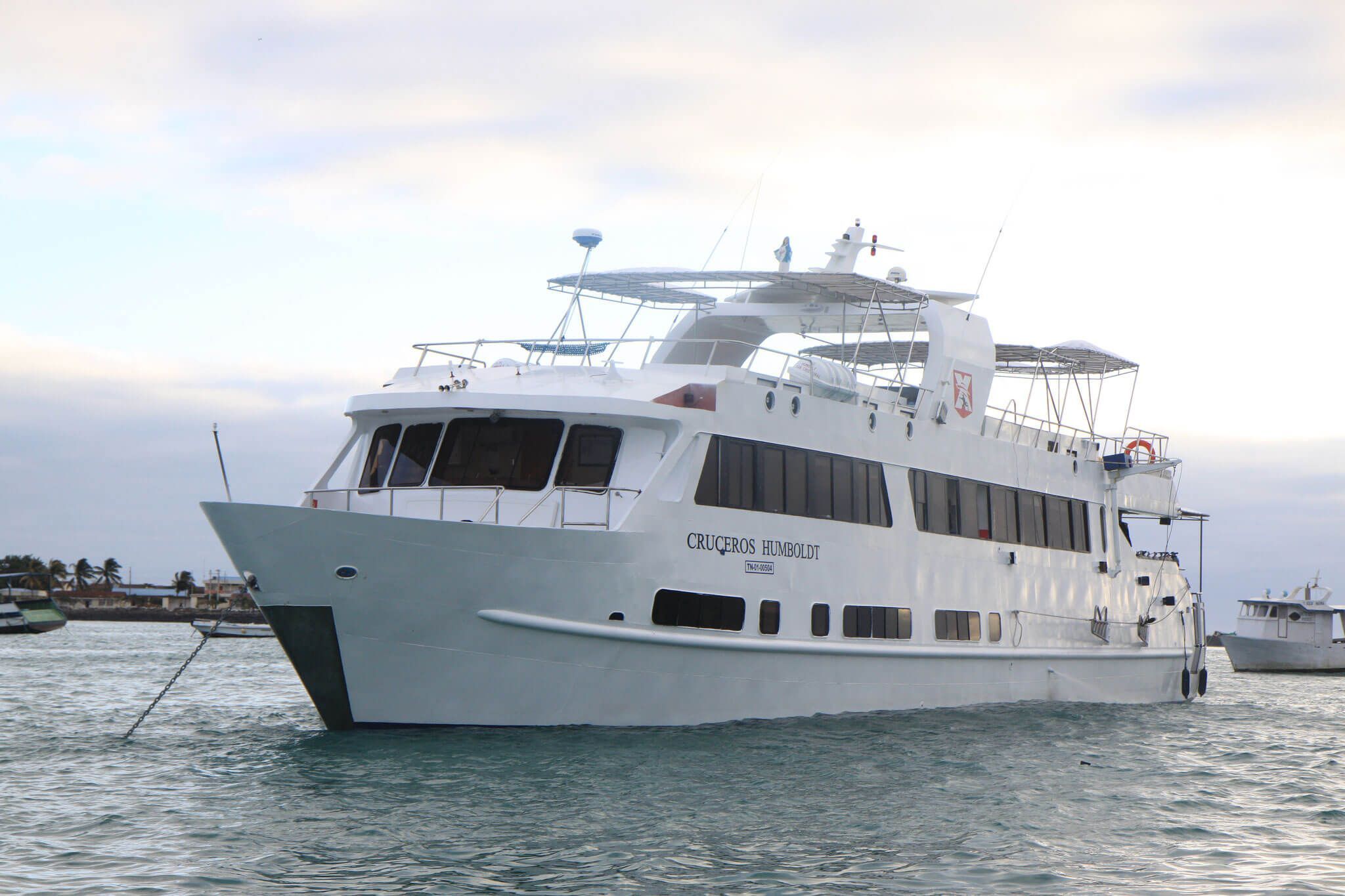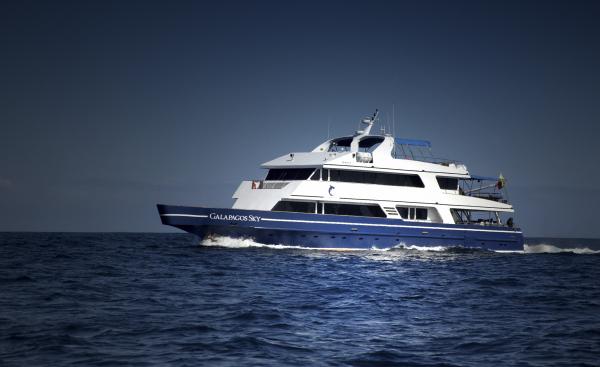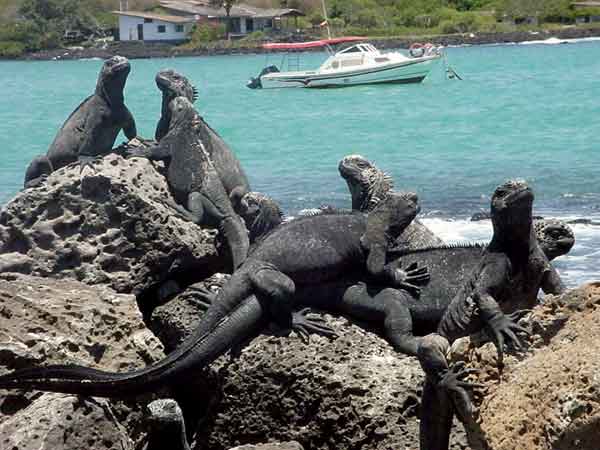Day 1: Sunday
Isla Lobos- Check out dive
When you arrive at the airport at San Cristobal on Sunday (Avianca flight 1636), the crew of the Galapagos Sky will personally meet you, collect your luggage, and escort you to the Galapagos Sky. Your luggage will be delivered to the dive deck for you. After everyone is on board, we will introduce you to the boat and do our mandatory safety briefings and drill. Then, we cruise to the area of Los Lobos for your check-out dive.
This will be your first underwater introduction to Galapagos sea lions and fur seals! Watch them Zoom in and out and dance playfully for you!
Even on the first day of your live-aboard cruise – you begin to see the myriad and diverse land formations which comprise the Galapagos Islands topside. It is then you realize you will see nothing like it in your lifetime.
Day 2: Monday
Bartolome Land walk / Cousins 2 dives
Bartolome is a lovely area where guests enjoy a favorite land tour where they can climb to the top of the hill to where breathe taking views abound. Conditions permitting, snorkeling with penguins will be allowed.
Cousins Rocks- this dive is an itinerary favorite and is done along a beautiful wall and allows for great viewing opportunities for corals, frog fish, sea horses, scorpion fish and octopus. It is also a great dive for large schools of Barracuda and also Hammerhead shark sightings. Sea lions will be your companions upon entry and on the safety stops.
By definition, the entire Galapagos Archipelago is geographically remote. But after this day of your live-aboard cruise finds you heading toward the most isolated, northernmost part of the Galapagos Islands – the uninhabited, untouched, twin cathedrals of world class diving – Wolf and Darwin Islands.
Day 3 – 4 – 5: Tuesday – Wednesday – Thursday
Wolf & Darwin
- Tues-4 Dives a day at Wolf plus a night dive
- Wed- 4 dives at Darwin
- Thurs-3 Dives total, 2 at Darwin and 1 afternoon dive at Wolf before long transit back to central islands
Diving Wolf and Darwin
You’ll spend the next three days diving (up to four dives per day plus a night dive) the legendary islands of WOLF & DARWIN.
Most experienced divers will agree, Wolf and Darwin can provide some of the best diving encounters in the world! Whale sharks are common here from Mid May through November. At The Arch at Darwin, you will see hammerhead sharks either individually, in small groups, or large schools. Bottlenose dolphins are common. The reef contains many warm water varieties of fish found nowhere else in the Islands.
Once you see Wolf and Darwin – you’ll immediately understand why there are no shore excursions on this part of the cruise – there is no way up the vertical cliffs!
Darwin Island: Considered by many experienced divers as the very best dive site in the world, The Arch at Darwin island (actually several dive sites depending on where you enter, currents, etc) honors its reputation. It is warmer by a few degrees than the central islands. In one single dive you can find schooling hammerhead sharks, Galapagos sharks, large pods of dolphins, thick schools of skipjack and yellow fin tuna, big eye jacks, mobula rays, and silky sharks. From June to November, it is not uncommon to encounter whale sharks in multiple numbers on one single dive. The presence of occasional tiger sharks, black and blue marlin, and killer whales adds on to this amazing diving experience. If you still have time to look for smaller stuff, you’ll find octopus, flounders, and an enormous variety and abundance of tropical fish. Darwin Island is the biggest jewel on the Galapagos Crown.
Wolf Island: One of those magical islands, with several dive sites to choose from. If you want to see sharks, you are at the right spot. This is a place for schooling hammerhead sharks, large aggregations of Galapagos sharks, and occasionally whale sharks. Seeing dolphins, large schools of tuna, spotted eagle rays, barracudas, sea lions and sea turtles is common. The bottom is littered with hundreds of moray eels, many of them free swimming. Being several degrees warmer than the central islands, you can look for many representatives of the Indo-Pacific underwater fauna. On a night dive here you will also enjoy spotting and watching the Red Lipped bat fish walk along the bottom of the sea!
Day 6: Friday
Cabo Douglas 1 dive / Punta Vicente Roca up to 2 dives and Panga ride if time allows
At Cape (Cabo) Douglas, on the western side of Isabela Island, we will do 1 dive Friday morning. Here you can expect to see Galapagos Penguins, Marine Iguanas, Flighless Cormorants, Sea Lions, Seahorse, Sea Turtles, Horn Sharks, Red Lipped Batfish, and occasional hammerhead sharks and white tip sharks. Also keep an eye out for chevron barracuda, snappers, yellow fin tuna, rainbow runners, and wahoo. There are also a lot of smaller fishes like creole fishes, parrot fishes, scrawled filefishes, pacific box fishes, and tiger snake eels.
This day we also visit Punta Vincente Roca for up to 2 dives. Our coldest yet rapidly increasing favorite dive – steep, deep vertical wall covered in soft coral, sponges, and endemic black coral. Regular sightings of mola mola (oceanic sun fish,) sea horses, bullhead sharks, red lipped bat fish, various shrimp and many other marine invertebrates. Keep your eyes open for fly bys from the flightless cormorants, penguins and maybe even a marine iguana. Our after-dive panga ride offers great topside photo ops for penguins, flightless cormorants, marine iguanas, sea lions, blue footed & nazca booby Birds, magnificent frigates and noddy terns. The diving here is chilly (particularly below the thermocline – but not to be missed!).
Day 7: Saturday
Northeast tip of Isla Pinzon/Islote Dumb- 1 dive / Puerto Ayora/Highlands tour
Isla Pinzon – NEWEST SITE TO THE ITINERARY- first visited in 2013! While diving Isla Pinzon you will be provided opportunities for encounters with a variety of species of sharks, sea lions, mantas, eagle rays, and moray eels. Many Species of fish and tropicals including yellow tailed surgeonfish, king angelfish, moorish idols, steel pompanos, snappers, grunts, creole fish, and barracuda.
This dive is then followed by a transit to Itabaca Channel where guests will be transferred by bus (at approx. 1400h and approx.. 45 minute ground transfer) to visit the Highlands of Santa Cruz to see the Galapagos Tortoises in their natural environment; and visit to Puerto Ayora. Guests will then be transferred back to Itabaca Channel to board the Galapagos Sky approx. 1900h. The Sky will then return to San Cristobal for Sunday morning cruise completion.
Day 8: Sunday
Land Tour and Day of Departure
Arrive San Cristobal—(Land Excursion) visit the Interpretation Center where an interesting human history of Galapagos is presented, town walk (last chance for shopping). Late morning departure.

 Русский
Русский












